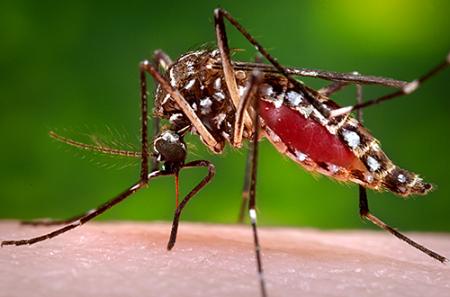 Arbovirus is an informal name used to refer to any viruses that are transmitted by arthropods, a phylum of animals including mosquitoes, ticks, mites and other insects. These viruses cause some of the most dangerous diseases to both public health and deployed Service Members including dengue, Zika, tick-borne encephalitis and others, causing millions of infections each year. AFRIMS works with regional partners to identify, characterize and overcome arboviruses by developing pharmacological and public health strategies. These activities include developing and testing novel vaccines, diagnostics and drugs to prevent and treat disease as well as insect control strategies to prevent virus-carrying mosquitoes from proliferating. With a changing climate that makes more areas of the world more favorable to arthropods for more months of the year, arboviruses will continue to be a significant threat to force health protection. Arbovirus is an informal name used to refer to any viruses that are transmitted by arthropods, a phylum of animals including mosquitoes, ticks, mites and other insects. These viruses cause some of the most dangerous diseases to both public health and deployed Service Members including dengue, Zika, tick-borne encephalitis and others, causing millions of infections each year. AFRIMS works with regional partners to identify, characterize and overcome arboviruses by developing pharmacological and public health strategies. These activities include developing and testing novel vaccines, diagnostics and drugs to prevent and treat disease as well as insect control strategies to prevent virus-carrying mosquitoes from proliferating. With a changing climate that makes more areas of the world more favorable to arthropods for more months of the year, arboviruses will continue to be a significant threat to force health protection. |
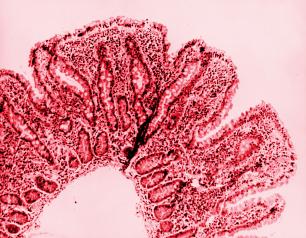 Diarrhea remains a leading cause of acute morbidity among civilian and military members alike, negatively impacting the health and functionality of both populations. U.S. military personnel often are deployed into developing regions in which enteric pathogens associated with diarrheal disease are prevalent. Documented studies from previous exercises in Thailand demonstrated that U.S. Soldiers suffer consistent diarrhea attack rates during their first few weeks in-country. Acute diarrhea in deployed military personnel increases health care service utilization, contributes to a major loss of work-hours and adversely impacts operational readiness. While a number of strategies have been used to mitigate this threat to military personnel, diarrhea, and the associated increases in antimicrobial resistance of enteric bacterial pathogens, remains a primary concern for force health protection. AFRIMS tracks the causes of diarrhea in both host nation and traveler populations in Thailand, Nepal, Cambodia and the Philippines, including at sites maintained in collaboration with the Royal Thai Army. Diarrhea remains a leading cause of acute morbidity among civilian and military members alike, negatively impacting the health and functionality of both populations. U.S. military personnel often are deployed into developing regions in which enteric pathogens associated with diarrheal disease are prevalent. Documented studies from previous exercises in Thailand demonstrated that U.S. Soldiers suffer consistent diarrhea attack rates during their first few weeks in-country. Acute diarrhea in deployed military personnel increases health care service utilization, contributes to a major loss of work-hours and adversely impacts operational readiness. While a number of strategies have been used to mitigate this threat to military personnel, diarrhea, and the associated increases in antimicrobial resistance of enteric bacterial pathogens, remains a primary concern for force health protection. AFRIMS tracks the causes of diarrhea in both host nation and traveler populations in Thailand, Nepal, Cambodia and the Philippines, including at sites maintained in collaboration with the Royal Thai Army. |
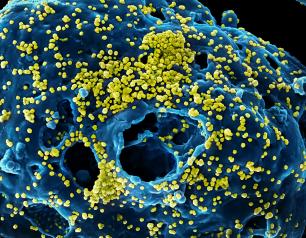 The first quarter of the 21st century has demonstrated the risk of emerging and re-emerging infectious diseases with changing climate, urbanization and the growing global economy introducing vectors to new areas and pathogens to new vectors. As of 2021, diseases like West Nile, Ebola, Zika, avian influenza, SARS-CoV, MERS-CoV, swine influenza and SARS-CoV-2 have emerged or remerged, causing epidemics and pandemics. As these diseases are new, medical countermeasures are frequently limited or non-existent, creating a significant danger to force health protection and public health. Medical interventions typically require several years until emergency approval much less full licensure, leaving a major gap in force health protection. With decades of experience identifying and overcoming infectious diseases, AFRIMS is well positioned to rapidly shift its focus to overcome the most pressing threats of the day. Established study sites and ongoing collaborations across Southeast Asia allowed researchers to effectively reallocate resources and staff from legacy programs to address the COVID-19 pandemic. The first quarter of the 21st century has demonstrated the risk of emerging and re-emerging infectious diseases with changing climate, urbanization and the growing global economy introducing vectors to new areas and pathogens to new vectors. As of 2021, diseases like West Nile, Ebola, Zika, avian influenza, SARS-CoV, MERS-CoV, swine influenza and SARS-CoV-2 have emerged or remerged, causing epidemics and pandemics. As these diseases are new, medical countermeasures are frequently limited or non-existent, creating a significant danger to force health protection and public health. Medical interventions typically require several years until emergency approval much less full licensure, leaving a major gap in force health protection. With decades of experience identifying and overcoming infectious diseases, AFRIMS is well positioned to rapidly shift its focus to overcome the most pressing threats of the day. Established study sites and ongoing collaborations across Southeast Asia allowed researchers to effectively reallocate resources and staff from legacy programs to address the COVID-19 pandemic. |
 Multidrug-resistant organisms are an increasing challenge for healthcare institutions worldwide. Drug resistance is spreading at an alarming rate among a variety of bacterial and parasitic species, causing both community-acquired and nosocomial infections without effective treatment options. These infections are particularly dangerous for combat wounds, sometimes resulting in the loss of life and limb; furthermore, as Service Members are evacuated to higher levels of care, these infections can travel with them, spreading throughout the world. To effectively overcome this threat, new care must be given to detecting, preventing and controlling MDROs at all levels, ranging from small community focal efforts to the entire international community. AFRIMS studies highly problematic antibiotic resistant bacteria including ESKAPE-E and diarrheal pathogens, informing force health protection as well as in vitro screening for new drugs and drug combinations and in vivo testing of compounds, antimicrobial peptides and bacteriophages. Multidrug-resistant organisms are an increasing challenge for healthcare institutions worldwide. Drug resistance is spreading at an alarming rate among a variety of bacterial and parasitic species, causing both community-acquired and nosocomial infections without effective treatment options. These infections are particularly dangerous for combat wounds, sometimes resulting in the loss of life and limb; furthermore, as Service Members are evacuated to higher levels of care, these infections can travel with them, spreading throughout the world. To effectively overcome this threat, new care must be given to detecting, preventing and controlling MDROs at all levels, ranging from small community focal efforts to the entire international community. AFRIMS studies highly problematic antibiotic resistant bacteria including ESKAPE-E and diarrheal pathogens, informing force health protection as well as in vitro screening for new drugs and drug combinations and in vivo testing of compounds, antimicrobial peptides and bacteriophages. |
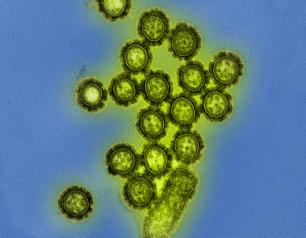 Viral respiratory pathogens are easily transmitted person-to-person, creating high risk of infection in crowded or population dense environments. Historically, military populations have been at high risk for acute respiratory infections, especially among recruits and deployed personnel. At times, the living conditions under which U.S. military members operate are austere, crowded and stressful, which makes these individuals particularly vulnerable to infection and transmission of respiratory pathogens like influenza compared to civilian populations. Emerging respiratory viruses like SARS-CoV-2 can cause global pandemics, creating significant disturbance to public health and military readiness. AFRIMS maintains an extensive research network in Southeast Asia to track and characterize endemic and emerging respiratory viruses, contributing to the World Health Organization Influenza Surveillance Network and force health protection studies as well as the development and testing of vaccine and diagnostic countermeasures. Viral respiratory pathogens are easily transmitted person-to-person, creating high risk of infection in crowded or population dense environments. Historically, military populations have been at high risk for acute respiratory infections, especially among recruits and deployed personnel. At times, the living conditions under which U.S. military members operate are austere, crowded and stressful, which makes these individuals particularly vulnerable to infection and transmission of respiratory pathogens like influenza compared to civilian populations. Emerging respiratory viruses like SARS-CoV-2 can cause global pandemics, creating significant disturbance to public health and military readiness. AFRIMS maintains an extensive research network in Southeast Asia to track and characterize endemic and emerging respiratory viruses, contributing to the World Health Organization Influenza Surveillance Network and force health protection studies as well as the development and testing of vaccine and diagnostic countermeasures.
|
 Sexually transmitted infections are transmitted from an infected person to an uninfected person through sexual contact. STIs can be caused by bacteria, viruses or parasites and include diseases like HIV/AIDS and gonorrhea. STIs, in particular HIV, are prevalent around the world, and can sometimes require expensive, life-long treatments to maintain remission. This creates a significant economic strain which can be accompanied by political instability, particularly in developing countries. In military contexts, STIs can be a significant danger to the walking blood bank during combat casualty care, making effective screening and prevention strategies a top priority for deployed medicine. AFRIMS maintains significant medical infrastructure in Southeast Asia to track STIs to understand how pathogens evolve and how they cause disease to inform the development of diagnostics, drugs and vaccines and has led in several field-leading accomplishments including the RV144 HIV vaccine trial, currently the only HIV vaccine trial worldwide to demonstrate partial efficacy. Sexually transmitted infections are transmitted from an infected person to an uninfected person through sexual contact. STIs can be caused by bacteria, viruses or parasites and include diseases like HIV/AIDS and gonorrhea. STIs, in particular HIV, are prevalent around the world, and can sometimes require expensive, life-long treatments to maintain remission. This creates a significant economic strain which can be accompanied by political instability, particularly in developing countries. In military contexts, STIs can be a significant danger to the walking blood bank during combat casualty care, making effective screening and prevention strategies a top priority for deployed medicine. AFRIMS maintains significant medical infrastructure in Southeast Asia to track STIs to understand how pathogens evolve and how they cause disease to inform the development of diagnostics, drugs and vaccines and has led in several field-leading accomplishments including the RV144 HIV vaccine trial, currently the only HIV vaccine trial worldwide to demonstrate partial efficacy. |
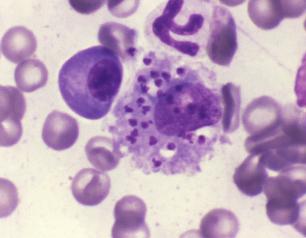 Vector-borne diseases are infections spread by insects, rodents and other animals and include some of the most dangerous diseases to both public health and deployed Service Members including malaria, dengue, Zika, tick-borne encephalitis and others, causing millions of infections each year. AFRIMS works with regional partners to identify, characterize and overcome vector-borne disease by developing pharmacological and public health strategies. These activities include developing and testing novel vaccines, diagnostics and drugs to prevent and treat disease as well as vector control strategies to prevent virus-carrying animals from proliferating. With a changing climate that makes more areas of the world more favorable to vectors of disease for more months of the year, these diseases will continue to be a significant threat to force health protection. Vector-borne diseases are infections spread by insects, rodents and other animals and include some of the most dangerous diseases to both public health and deployed Service Members including malaria, dengue, Zika, tick-borne encephalitis and others, causing millions of infections each year. AFRIMS works with regional partners to identify, characterize and overcome vector-borne disease by developing pharmacological and public health strategies. These activities include developing and testing novel vaccines, diagnostics and drugs to prevent and treat disease as well as vector control strategies to prevent virus-carrying animals from proliferating. With a changing climate that makes more areas of the world more favorable to vectors of disease for more months of the year, these diseases will continue to be a significant threat to force health protection. |